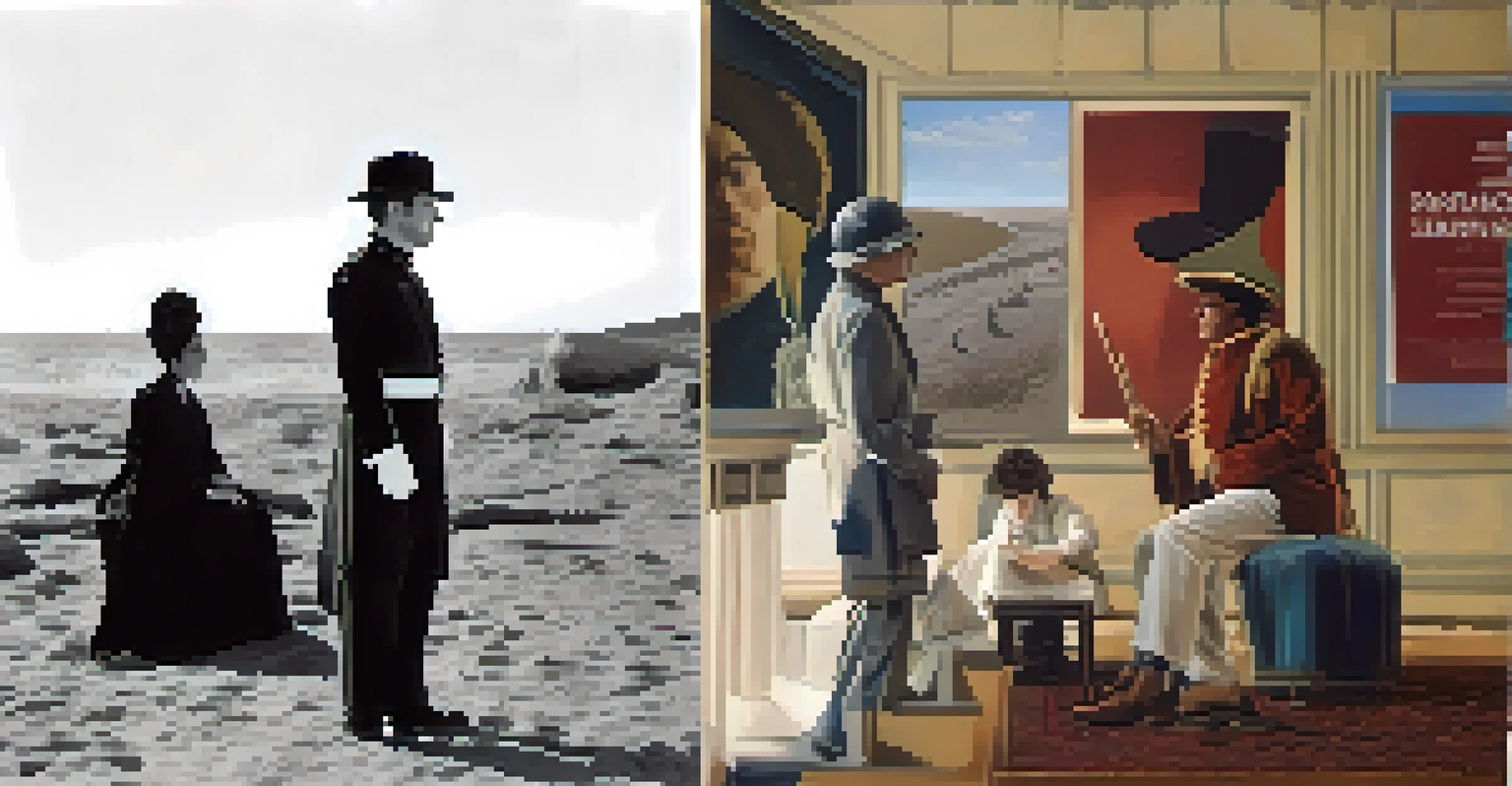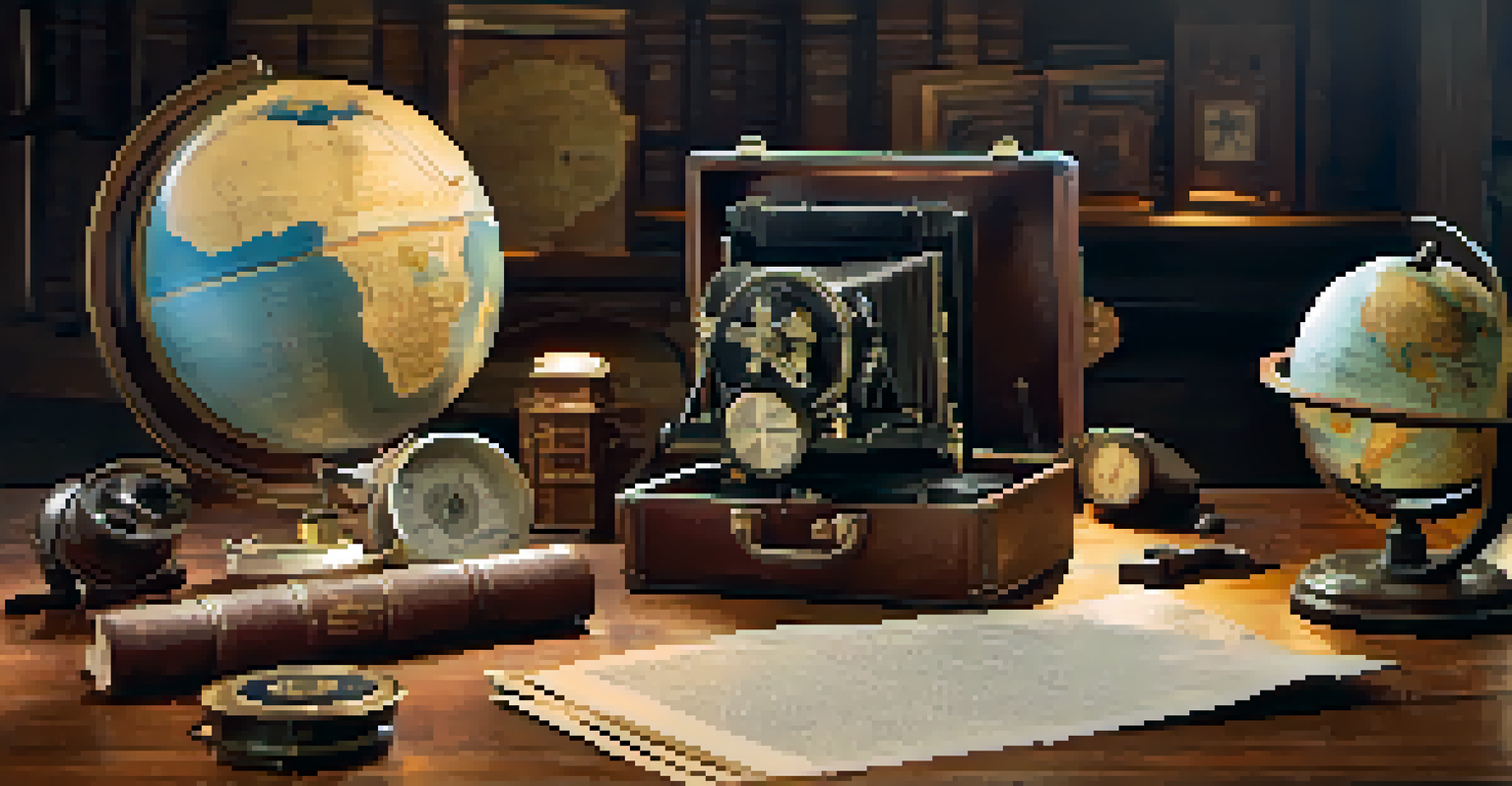Hollywood's Role in Rewriting History Through Popular Cinema

The Intersection of Film and History: A Powerful Bond
Hollywood has a unique ability to blend fact and fiction, creating compelling narratives that resonate with audiences. This intersection of film and history often shapes our collective memory, influencing how we perceive significant events. Movies like 'Saving Private Ryan' or '12 Years a Slave' invite viewers to engage emotionally with the past, making history feel immediate and relevant.
Cinema is a mirror by which we often see ourselves.
However, the portrayal of historical events can sometimes lean towards dramatization, prioritizing entertainment over accuracy. This results in a version of history that might be engaging but can distort the facts. For example, films may take creative liberties with timelines or characters, leading audiences to accept these portrayals as truth.
Ultimately, this powerful bond between film and history creates a double-edged sword. While it can spark interest in historical topics and encourage further exploration, it can also perpetuate misconceptions. Thus, understanding this relationship is crucial for viewers who wish to separate fact from fiction.
The Role of Screenwriters in Shaping Historical Narratives
Screenwriters are pivotal in crafting stories that resonate with audiences, often making choices that prioritize narrative over historical accuracy. Their decisions can transform real events into gripping tales, which is essential for maintaining viewer engagement. For instance, the film 'Titanic' captures a tragic historical event while focusing heavily on a fictional love story.

This creative control means that screenwriters often have to balance authenticity with storytelling needs. They might choose to highlight certain aspects of history while downplaying or omitting others to enhance drama. This selective storytelling can lead to a skewed understanding of the actual events portrayed.
Film Shapes Historical Perception
Movies can transform our understanding of history, blending fact with fiction to engage viewers emotionally.
While screenwriters have the freedom to create engaging narratives, it raises questions about the responsibility that comes with this power. Should they strive for accuracy, or is their primary goal to entertain? This ongoing debate shapes how audiences interpret the historical narratives presented in popular cinema.
Audience Perception: How Viewers Interpret Historical Films
The way audiences perceive historical films can vary significantly based on their prior knowledge and experiences. A viewer well-versed in history may notice inaccuracies that a casual moviegoer might overlook. This disparity can lead to differing interpretations of the same film, affecting its overall impact.
The past is never dead. It's not even past.
Moreover, cultural backgrounds play a significant role in shaping these perceptions. For instance, someone from the U.S. may interpret the events of the Vietnam War depicted in films like 'Full Metal Jacket' differently than someone from Vietnam. These varied perspectives highlight the subjective nature of viewing historical narratives in cinema.
As viewers, it’s essential to approach historical films with a critical mind. Recognizing the artistic liberties taken can enrich our understanding of both the film and the actual events. Engaging with history through cinema can be an opportunity for learning, provided we remain open to questioning the portrayals we see on screen.
The Impact of Blockbusters on Historical Awareness
Blockbuster films have the power to bring historical events to the forefront of public consciousness. Movies like 'Gladiator' or 'Lincoln' not only entertain but also spark discussions about the past. These films can motivate viewers to learn more about the events and figures they depict, often leading to increased historical awareness.
However, the challenge lies in the fact that these films often prioritize spectacle over substance. While they may highlight significant events, they can also gloss over the complexities and nuances of history. As a result, audiences may leave the theater with a simplified understanding of the past.
Screenwriters Balance Story and Truth
The choices of screenwriters often prioritize narrative engagement over historical accuracy, leading to skewed portrayals.
Thus, while blockbusters can serve as valuable entry points into historical topics, they should not be relied upon as definitive sources. Encouraging audiences to seek out additional information can help bridge the gap between cinematic portrayals and the rich tapestry of actual history.
Documentaries vs. Dramatizations: A Fine Line
The distinction between documentaries and dramatizations is crucial in understanding Hollywood's role in history. Documentaries aim to present factual accounts, often backed by research and expert opinions. On the other hand, dramatizations take creative liberties to enhance storytelling, making them more susceptible to inaccuracies.
For example, a documentary about World War II might include firsthand accounts and archival footage, providing a comprehensive view of the era. In contrast, a film like 'Inglourious Basterds' offers a fictionalized account that plays fast and loose with historical facts for entertainment. This difference in approach can lead to varying levels of credibility and audience trust.
As consumers of media, it’s important to recognize these differences. While both formats can be educational, understanding the intent behind each can help viewers discern what they are learning about history. This awareness fosters a more informed audience that appreciates the value of both documentaries and dramatized films.
Revisiting History: The Role of Remakes and Reboots
Hollywood often revisits historical narratives through remakes and reboots, allowing filmmakers to reinterpret events from different perspectives. This practice can breathe new life into stories that may have been overlooked or misrepresented in earlier versions. For instance, the recent adaptation of 'The 1619 Project' seeks to reframe the narrative around slavery in America, offering a fresh lens for understanding this complex history.
However, remakes can also face criticism for perpetuating old myths or failing to address previous inaccuracies. When a new version is released, audiences may expect it to correct the errors of its predecessor, but that's not always the case. For instance, a remake of a classic film may still reinforce outdated stereotypes or narratives, leading to ongoing misconceptions.
Critical Viewing Enhances Learning
Audiences must approach historical films critically to discern artistic liberties and foster a deeper understanding of the past.
This cycle of revisiting history highlights the importance of critical engagement with films. Audiences should be encouraged to analyze how each new portrayal shapes their understanding of the past, fostering a culture of inquiry. By doing so, viewers can appreciate the evolution of historical narratives while recognizing the responsibility that comes with retelling these stories.
The Ethical Responsibility of Filmmakers in Historical Representation
As the creators of historical narratives, filmmakers bear a significant ethical responsibility in how they portray real events and figures. This responsibility extends to the accuracy of their depictions and the potential impact on public understanding. Filmmakers must consider the consequences of their artistic choices, especially when addressing sensitive topics.
For instance, films that depict war or oppression must navigate the fine line between dramatization and respect for those who experienced these events. Misrepresentations can lead to misunderstandings and perpetuate harmful stereotypes, making it crucial for filmmakers to approach such stories with care. Understanding the historical context helps in crafting narratives that honor the truth.

Ultimately, the ethical responsibility of filmmakers to represent history accurately is a shared journey between creators and audiences. Encouraging open discussions about these representations can lead to a deeper understanding of the past and its implications for the present. By fostering awareness, both filmmakers and viewers can contribute to a more informed dialogue about history in popular cinema.